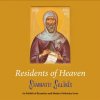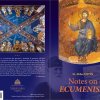An Exhibit of Byzantine and Modern Orthodox Icons
Residents of Heaven is a book of Icons by Father Stamatis Skliris which were prepared for "An Exhibit of Byzantine and Modern Orthodox Icons" held at the "David Allan Hubbard Library, Fuller Theological Seminary" in Pasadena, California, June 10 - July 5, 2010.
The iconographer, V. Rev. Stamatis Skliris, attended the opening of the exhibit with His Grace, Bishop Maxim who gave the Introduction. The mounting of the display was done by Jasminka Gabrie and the staff of the Fuller Library. The opening event was organized by Dr. William Dyrness, Director of the Visual Faith Institute, Brehm Center for Worship, Theology and the Arts, Fuller Seminary.






